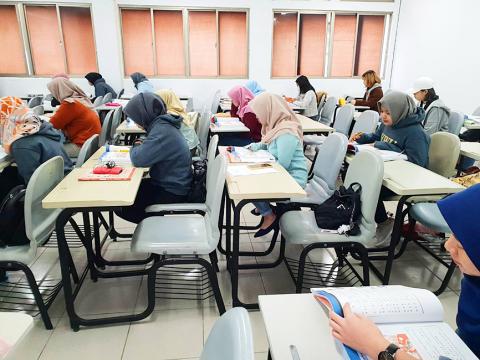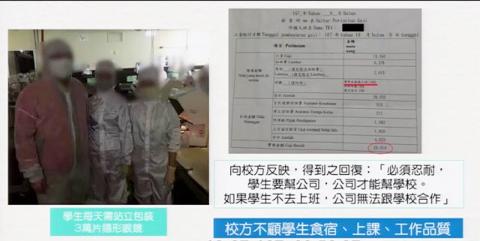Hundreds of Southeast Asian students recruited to Taiwanese universities under the government’s New Southbound Policy have allegedly been tricked into doing illegal work at factories, with some working 10 hours per day, Chinese Nationalist Party (KMT) Legislator Ko Chih-en (柯志恩) said yesterday.
At least six schools have allegedly collaborated with employment agencies and companies to make their students provide cheap labor, Ko told a meeting of the Legislative Yuan’s Education and Culture Committee.
One school, which she later identified as Hsing Wu University in New Taipei City’s Linkou District (林口), arranged for its students to work 10 hours per day, four days per week at an optics manufacturer, she said.

Photo courtesy of Hsing Wu University
“They had to stand for 10 hours and package 30,000 contact lenses every day” and were banned from taking any leave, she said.
When students told the school about their work, it replied that they “must help the company so that the company can help the school,” she said.
The students were assigned to shabby dormitories in Hsinchu to be near their work, she said, adding that the rooms did not have desks.

Photo: Lin Hsiao-yun, Taipei Times
“Two days a week, they would have to wake up at 5am and be driven to Linkou for classes on a bus [arranged by the school] that departs at 6am,” she said.
Employment agencies tricked many of the approximately 200 students into applying for the program through advertisements claiming that they would be offered free accommodation and meals, as well as a monthly salary of about NT$20,000 for “internship” work, Ko said.
However, after arriving, the students realized that starting from their sophomore year, they would need to pay more than NT$40,000 every semester for tuition, accommodation and other expenses, which placed them under great financial pressure, she said.
“This is not an isolated case, but a reoccurring pattern” that shows how schools, employment agencies and companies are taking advantage of the New Southbound Policy internship program designed to encourage students from Southeast Asia to take classes and complete internships, she said.
“Schools offer internship programs and receive subsidies from the Ministry of Education, and employment agencies trick students into joining the programs,” Ko said. “Schools then arrange for internships at companies, which pay employment agencies for introducing the workers.”
Many agencies have boasted about how students recruited under the program are more “useful” than migrant workers, as they are not subject to labor law restrictions, she said.
The ministry has been aware of the problem since last year and has warned schools against recruiting students through employment agencies, Acting Minister of Education Yao Leeh-ter (姚立德) said.
“Those found to have done so would lose subsidies and be banned from offering international internship programs and, in more serious cases, required to receive special consultation,” he said.
The ministry’s international internship program requires review, he added, promising to launch investigations into all schools involved.
Students can perform part-time work that is unrelated to their school work as long as it does not exceed 20 hours per week, he said.
“If students are exploited, we would definitely intervene,” he added.
Hsing Wu University did not recruit students through employment agencies and only helped arrange legal part-time work for students who needed income to cover their living expenses, university vice president Chen Yi-wen (陳義文) told reporters at a news conference after the meeting.
Companies have provided free accommodation to 25 students and compromised by exempting Indonesian students from night shifts for their prayers, university international section head Kuo An-min (國安民) said, adding that the students’ lives have turned “from black and white to full color” because of the program.
Additional reporting by Rachel Lin

TRAGEDY STRIKES TAIPEI: The suspect died after falling off a building after he threw smoke grenades into Taipei Main Station and went on a killing spree in Zhongshan A 27-year-old suspect allegedly threw smoke grenades in Taipei Main Station and then proceeded to Zhongshan MRT Station in a random killing spree that resulted in the death of the suspect and two other civilians, and seven injured, including one in critical condition, as of press time last night. The suspect, identified as a man surnamed Chang Wen (張文), allegedly began the attack at Taipei Main Station, the Taipei Fire Department said, adding that it received a report at 5:24pm that smoke grenades had been thrown in the station. One man in his 50s was rushed to hospital after a cardiac arrest

SAFETY FIRST: Double the number of police were deployed at the Taipei Marathon, while other cities released plans to bolster public event safety Authorities across Taiwan have stepped up security measures ahead of Christmas and New Year events, following a knife and smoke bomb attack in Taipei on Friday that left four people dead and 11 injured. In a bid to prevent potential copycat incidents, police deployments have been expanded for large gatherings, transport hubs, and other crowded public spaces, according to official statements from police and city authorities. Taipei Mayor Chiang Wan-an (蔣萬安) said the city has “comprehensively raised security readiness” in crowded areas, increased police deployments with armed officers, and intensified patrols during weekends and nighttime hours. For large-scale events, security checkpoints and explosives

A car bomb killed a senior Russian general in southern Moscow yesterday morning, the latest high-profile army figure to be blown up in a blast that came just hours after Russian and Ukrainian delegates held separate talks in Miami on a plan to end the war. Kyiv has not commented on the incident, but Russian investigators said they were probing whether the blast was “linked” to “Ukrainian special forces.” The attack was similar to other assassinations of generals and pro-war figures that have either been claimed, or are widely believed to have been orchestrated, by Ukraine. Russian Lieutenant General Fanil Sarvarov, 56, head

PUBLIC SAFETY: The premier said that security would be tightened in transport hubs, while President Lai commended the public for their bravery The government is to deploy more police, including rapid response units, in crowded public areas to ensure a swift response to any threats, President William Lai (賴清德) said yesterday after a knife attack killed three people and injured 11 in Taipei the previous day. Lai made the remarks following a briefing by the National Police Agency on the progress of the investigation, saying that the attack underscored the importance of cooperation in public security between the central and local governments. The attack unfolded in the early evening on Friday around Taipei Main Station’s M7 exit and later near the Taipei MRT’s Zhongshan